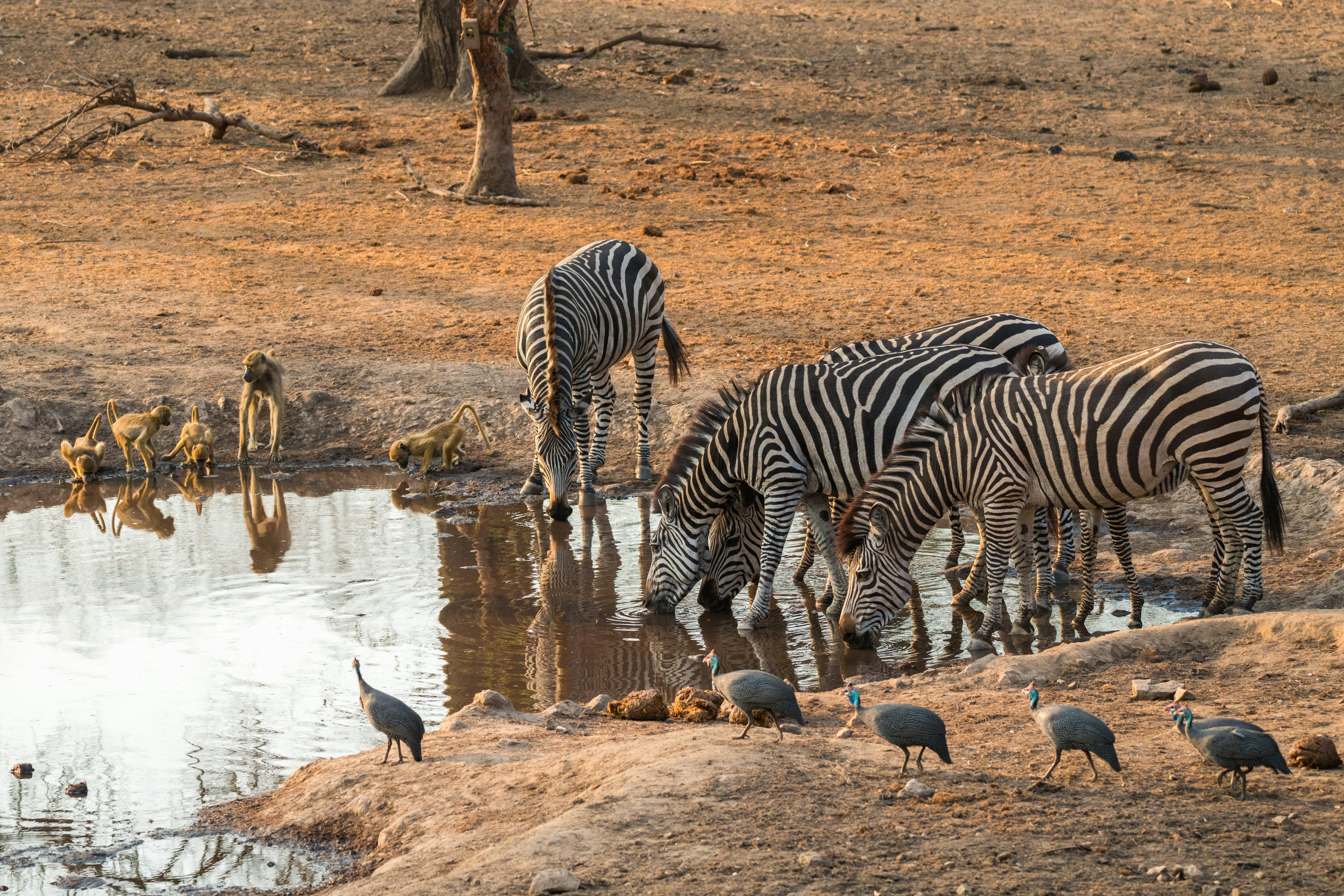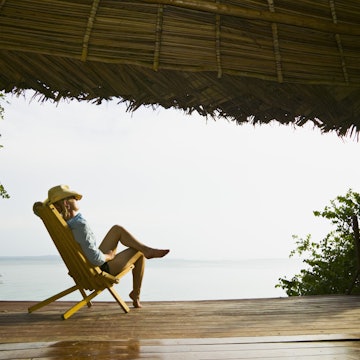

Malawi is home to beautifully diverse natural landscapes © Jason Grunsta / Getty Images
For a sand-and-safari experience, few African nations are able to outshine Malawi. Its stunning Lake Malawi boasts countless bays, beaches and islands to explore, particularly as a bookend to a safari in one of the country's wildlife parks.
But Malawi is more than its diverse natural landscapes. Travelers could spend weeks here exploring its tea and coffee farms and laid-back cities, all while sampling regional foods and experiencing cultural heritage sites. Here are the top places to visit in Malawi.
1. Lilongwe
Best for a relaxed city break
Travelers usually skip African cities for the wilderness, but the capital has worthwhile activities and attractions, including shopping, sporting events and places to eat. Lilongwe moves at a slow pace, making it a pleasant spot to rest before or after long international flights, or to recharge and resupply on a road trip.
A hike up Nkhoma Mountain is a good way to introduce yourself to the city. Panoramic views from the top reveal Lilongwe’s layout, highlighting the differences between the old town and the new capital city. One of Lilongwe’s best attractions, the Lilongwe Wildlife Centre, acts as a forested buffer between the two sections. It's the country’s only animal sanctuary dedicated to helping injured or rescued animals, with the aim of returning them to the wild. Shoppers will love Lilongwe’s many markets, and the Kanelolo Curios Market is packed with vendors selling paintings, wood carvings and jewelry.
Several hotels are located in or near downtown, including two from the popular Malawi-based chain Sunbird Hotels and Resorts. Kumbali Country Lodge, only 10 minutes from the city center, offers a pool, restaurant and spacious guest rooms among gardens on a working farm.
Planning tip: If you’re staying at Kumbali, try the Farmer’s Daughter, a cafe five minutes down the road serving crusty bread, farm-fresh salads and house-roasted Malawian coffee.
2. Lake Malawi National Park
Best place for a laidback yet wild experience
Most travelers heading to Malawi make a beeline for its namesake lake. The world’s first freshwater national park, Lake Malawi has tropical blue waters teeming with colorful cichlid fish, and its rocky islands, sandy beaches and jungle terrain provide habitats for birds, reptiles and mammals such as baboons, hippos, monkeys and leopards.
Unesco-listed Lake Malawi is 587km (365 miles) long and 84km (52 miles) wide, so exploring the sights can take weeks, given the area’s minimal infrastructure. Those with time and a backpack to stay nimble catch the MV Ilala Ferry. The ship has been running for 70 years and provides a lifeline for people transferring goods from the lake’s northern tip of Chilumba, near Tanzania, to Monkey Bay in the south, plus the islands in between. If you’re looking for a throwback journey to the era of slow, immersive travel, the Lake Malawi ferry is it.

3. Cape Maclear
Best place for getting a local experience
At the tip of Nankumba Peninsula, on the southern end of Lake Malawi, Cape Maclear is both a working fishing village and a popular tourist stop. Known locally as Chembe, this small enclave hemmed in by forested mountains has beachfront accommodation set within the community, and the proximity of guest chalets to homes creates a natural setting for travelers to interact with residents.
Recreational activities include kayaking, snorkeling and diving in the lake’s turquoise waters; spotting wildlife like hippos and African fish eagles; learning to cook with a local family; or simply lounging with a Castel beer on a boat at sunset.
Planning tip: Learn new skills from the locals and protect the natural landscape during your stay. Community members run workshops demonstrating how they upcycle materials like glass into jewelry or home decor, which is then sold at the Recycle Centre’s artisan shop in town.
4. Likoma Island
Best for luxury and flawless beaches
Travel guides tend to oversell the beaches of Lake Malawi, but Likoma Island deserves its reputation as the go-to for beach lovers. There are only two ways to get to there: a charter flight or the ferry, one of which requires money and the other time. Kaya Mawa, the island’s upscale lodge – complete with chalets secreted into the cliff sides, plunge pools and incredible scenery – is one of the best in Africa.
When you’re not swimming, snorkeling or quad biking through the baobab trees, visit the Katundu workshop, where artisans upcycle wine bottles from Kaya Mawa into unique tumbled-glass chandeliers that hang in fancy hotel lobbies across the continent. The beaded textiles and jewelry, made from recycled and sustainable materials in a safe and ethical work environment, make great souvenirs.
5. Marelli Island archipelago
Best area for diving
The Marelli Islands, located in the center of Malawi toward the southern end of the lake, are all about nature, both above and below water. Naturalist David Attenborough praised the lake’s 850 species of fish, some of which are endemic to the archipelago. Blue Zebra Island Lodge, located on Nankoma Island, operates a PADI dive center whose guides help guests spot the iridescent blue-striped Mbuna that lends the lodge its name. Onshore, birdwatchers won’t tire of spotting kingfishers, eagles, weavers, herons or the elusive red duiker. Simple, comfortable accommodations in chalets and safari tents connect you to the soothing sway of island life.
6. Blantyre
Best city for food and nightlife
Blantyre is Malawi’s second-largest city, a commercial hub and the gateway to attractions in the southern part of the country. Travelers driving to Majete, Thyolo, Mt. Mulanje, Michiru Mountain and Zomba Plateau stop in this spirited town filled with bars and restaurants.
Named for Scottish explorer David Livingstone's birthplace, Blantyre started as a mission base for the Church of Scotland in 1876, and relics of that era remain, including St Michael and All Angels Church and the 1882 Mandala House, a national monument with a cafe and art gallery. The bar at Doogles is the place to trade tips and stories with city-dwellers and backpackers. Before heading back into the bush, try the popular zinziri (barbecued quail).
Planning tip: Doogles also offers clean, quality accommodation in the form of both private rooms and dorms – an excellent option if you're traveling on a tight budget.

7. Majete Wildlife Reserve
Best place to spot the big five
Visit Majete Wildlife Reserve to spot the Big Five and support a conservation success story. Poachers and human encroachment had destroyed the wildlife in the park, but in 2003, the non-profit conservation group African Parks partnered with the Malawi Department of National Parks and Wildlife to reintroduce black rhinos, lions, giraffes and other animals. Almost two decades later, flourishing wildlife has brought visitors to the park and economic opportunities to the community.
Animals congregate around two rivers, the Shire and Mkulumadzi. Split your viewing experiences between boat trips and night drives, or try a walking safari into the hilly woodlands and savannah. If you’re not at an all-inclusive lodge such as Thawale Camp or Robin Pope’s Mkulumadzi, local guides offer reasonably priced tours, and you can book a space at the community campsite.
Planning tip: The best time for spotting wildlife is during the dry season, which runs between April and October.
8. Shire Highlands
Best place to hike through a tea and coffee estate
For a change of scenery, journey into a verdant swath of southern Malawi where farmers grow tea and coffee. First cultivated here by the British in the 1900s, Camellia sinensis (the tea plant) thrives in the higher elevation of the Shire Highlands, thanks to the cooler climate. You can hike or mountain bike over lush hills, tour a tea factory and then relax with a cup of earthy oolong or natural-processed arabica from Satemwa Tea and Coffee Estate.
Looming in the backdrop, Mt. Mulanje rises into the mist at 3000m (9824ft). Fit and adventurous travelers can organize four-day treks up its slopes with local guides. The Thyolo district, pronounced “cho-lo,” is beautiful but has limited tourist infrastructure, including accommodations. If you’re not traveling with a tour company, some of the tea estates offer modest guesthouses, lodges or owners’ bungalows.
9. Liwonde National Park
Best park for a classic safari experience
Liwonde National Park is a classic safari experience with a superb riverscape – here, you’ll find hippos and crocodiles lounging on the lapping shores of the Shire River, and zebras and kudu fleeing leopards and lions on the nearby plains. Herds of elephants trundle across the lagoons and floodplains, stopping for a drink or a snack of mopani tree leaves. You can watch all the action from a boat, on foot or in a 4x4. Liwonde National Park has excellent lodging options, whether you’re up for splurging on an intimate, all-inclusive camp or saving with a self-catering safari tent.

10. Mzuzu
Best place to pick up some locally made souvenirs
Malawi’s third-largest city, Mzuzu is the cool-climate capital of the north and an important agricultural region that specializes in tea and coffee. Try a cup of fresh-brewed arabica or stroll the produce market of locally sourced goodies. Tailors in the Mataifa Market will fashion custom-made clothing out of the colorful patterned cloth called chitenge, sold everywhere. For most travelers, this low-rise town provides a good base for the region’s attractions.
Drive or catch a bus to nearby Nkhata Bay on Lake Malawi. The beaches of this popular backpacker spot, known for cheap scuba diving and a community vibe, are less than an hour away. On the border with Zambia, Nyika National Park entices in part because it’s hard to reach. Unless flying, intrepid overlanders in high-clearance vehicles are rewarded with a breathtaking landscape of undulating grasslands. Some find it evocative of Scotland – that is, until a zebra, antelope or leopard strolls into view.
Planning tip: On Sundays, locals set up speakers on the beach and relax together with a few beers.














